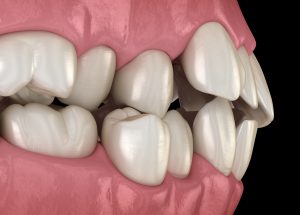 From a young age, your guardians have emphasized the importance of excellent oral care by helping you create and stick to a routine of brushing and flossing. For most, the biggest threat to their oral health is harmful oral bacteria that cause a slew of concerns ranging from decay to infection and even tooth loss. For others, the biggest problem can arise from a crooked smile. While the latter may seem more cosmetic in nature, there are actually a number of problems that can arise if it is not handled in an efficient manner. In today’s blog your Leawood, KS dentist will discuss the true dangers that accompany an uneven grin and how Invisalign® aligners can help.
From a young age, your guardians have emphasized the importance of excellent oral care by helping you create and stick to a routine of brushing and flossing. For most, the biggest threat to their oral health is harmful oral bacteria that cause a slew of concerns ranging from decay to infection and even tooth loss. For others, the biggest problem can arise from a crooked smile. While the latter may seem more cosmetic in nature, there are actually a number of problems that can arise if it is not handled in an efficient manner. In today’s blog your Leawood, KS dentist will discuss the true dangers that accompany an uneven grin and how Invisalign® aligners can help.
What To Remember In Your Dental Emergency
 While following a healthy preventive dental care regimen is the number one way to ensure a lifelong smile, the fact of the matter is that sometimes accidents happen. Whether you chip a tooth while eating a crunchy snack or have a mishap that leads a knocked-out structure, time is of the essence when it comes to repairing your tooth and restoring your smile. In today’s blog, your Leawood, KS dentist will discuss circumstances in which you may need emergency dental care and what you should do to ensure the best outcome.
While following a healthy preventive dental care regimen is the number one way to ensure a lifelong smile, the fact of the matter is that sometimes accidents happen. Whether you chip a tooth while eating a crunchy snack or have a mishap that leads a knocked-out structure, time is of the essence when it comes to repairing your tooth and restoring your smile. In today’s blog, your Leawood, KS dentist will discuss circumstances in which you may need emergency dental care and what you should do to ensure the best outcome.
A Conservative Approach To A Cracked Tooth
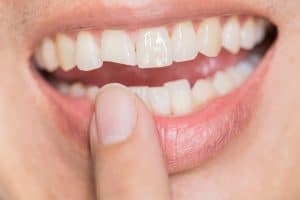
Many individuals endure a form of dental anxiety in which the notion of extensive treatment or excessive structural change bars them from attending necessary visits that keeps up with their oral health. What this also means is that their smiles are even more at risk for infections such as periodontal disease, tooth decay, and loss. For some, the same fear accompanies minor concerns such as a chipped or cracked tooth. In today’s blog, your Leawood, KS dentist will address the way that cosmetic dentistry can conservatively address these issues and leave you feeling fulfilled as you are once again able to enjoy a seamless grin.
Ways You Can Avoid Periodontal Disease
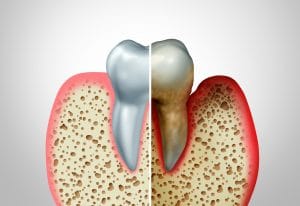 It can be challenging at times to keep track of your health, as there are multiple factors to take into consideration. From your physical health to mental health and even dental health, it takes constant work to make sure all is well. When it comes to your oral hygiene in particular, a number of concerns can cause decay, infection, and ultimately tooth loss. In today’s blog, your Leawood, KS dentist will address ways you can avoid loss through constant care for not only your teeth, but the surrounding oral structures as well.
It can be challenging at times to keep track of your health, as there are multiple factors to take into consideration. From your physical health to mental health and even dental health, it takes constant work to make sure all is well. When it comes to your oral hygiene in particular, a number of concerns can cause decay, infection, and ultimately tooth loss. In today’s blog, your Leawood, KS dentist will address ways you can avoid loss through constant care for not only your teeth, but the surrounding oral structures as well.
Replacing As Few Or As Many Teeth As Needed With Implants
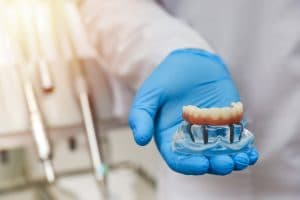 Losing a tooth as an adult can be a troubling process for many. What can be worse, however, is choosing not to replace the crown once it’s gone. Indeed, routine preventive care both in-office and at home is needed to ensure the health of your smile, and skipping even a portion of this routine could have negative effects in the long run. This can include decay, infection, and inevitably structural loss. In today’s blog, your Leawood, KS dentist will address what you can do to best preserve your oral health and restore function through the help of a dental implant.
Losing a tooth as an adult can be a troubling process for many. What can be worse, however, is choosing not to replace the crown once it’s gone. Indeed, routine preventive care both in-office and at home is needed to ensure the health of your smile, and skipping even a portion of this routine could have negative effects in the long run. This can include decay, infection, and inevitably structural loss. In today’s blog, your Leawood, KS dentist will address what you can do to best preserve your oral health and restore function through the help of a dental implant.
Time For Your Checkup!
 As we move forward with 2021 and lean into the second month of this year, our team encourages you to take a look at to do’s that may not have been addressed in January. After all, the new year often holds high hopes for a number of factors one wishes to address, but sometimes every goal cannot be achieved. In case it was pushed off, your oral health is one that your dentist will encourage does not spend much time on the back burner. In today’s blog, your Leawood, KS dentist will address what occurs during your preventive dental visit as well as how major of a role it plays in your overall oral health.
As we move forward with 2021 and lean into the second month of this year, our team encourages you to take a look at to do’s that may not have been addressed in January. After all, the new year often holds high hopes for a number of factors one wishes to address, but sometimes every goal cannot be achieved. In case it was pushed off, your oral health is one that your dentist will encourage does not spend much time on the back burner. In today’s blog, your Leawood, KS dentist will address what occurs during your preventive dental visit as well as how major of a role it plays in your overall oral health.
What Happens After You Lose A Tooth
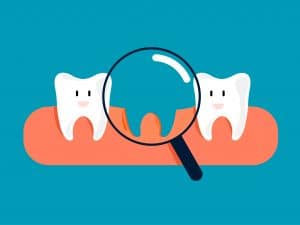 For a number of adults, tooth loss is a very real phenomenon often brought on from a number of concerns, including decay, infection, and not following up with routine checkups and cleanings. Indeed, multiple concerns arise if you do not tend to an infected or compromised structure, oftentimes leading your dentist to recommend extraction to preserve your oral health. But once that has taken place, keep in mind that your problems aren’t yet over. In today’s blog, your Leawood, KS dentist will address the negative effects of leaving a gap in your smile and what our team can do to help.
For a number of adults, tooth loss is a very real phenomenon often brought on from a number of concerns, including decay, infection, and not following up with routine checkups and cleanings. Indeed, multiple concerns arise if you do not tend to an infected or compromised structure, oftentimes leading your dentist to recommend extraction to preserve your oral health. But once that has taken place, keep in mind that your problems aren’t yet over. In today’s blog, your Leawood, KS dentist will address the negative effects of leaving a gap in your smile and what our team can do to help.
Times When Extraction Is Necessary
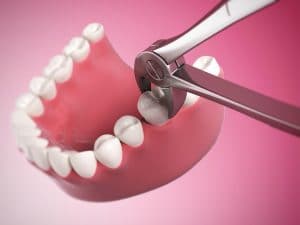 Being one stain or chip away from an otherwise perfect grin can be a nuisance. For a number of blemishes and discrepancies in your smile, however, cosmetic dentistry has a solution. Indeed, advanced practices nowadays makes correcting any visual issues fast and simple, and the same level of innovation and care is utilized to address bigger issues as well. With all of this in mind, however, sometimes a tooth or other concern progresses past a certain point, resulting in more extensive work and even the contemplation of removal. In today’s blog, your Leawood, KS dentist will explain the process involved with saving your smile and preserving your oral health, and when extraction is needed to do so.
Being one stain or chip away from an otherwise perfect grin can be a nuisance. For a number of blemishes and discrepancies in your smile, however, cosmetic dentistry has a solution. Indeed, advanced practices nowadays makes correcting any visual issues fast and simple, and the same level of innovation and care is utilized to address bigger issues as well. With all of this in mind, however, sometimes a tooth or other concern progresses past a certain point, resulting in more extensive work and even the contemplation of removal. In today’s blog, your Leawood, KS dentist will explain the process involved with saving your smile and preserving your oral health, and when extraction is needed to do so.
How In-Office Teeth-Whitening Yields Better Results
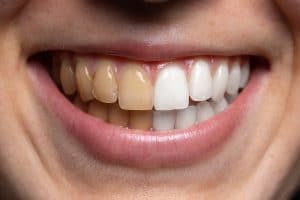 While you may be taking every step to ensure a lifelong smile – including brushing and flossing regularly, visiting our team twice a year for a routine examination and cleaning, and even paying extra mind to the foods and beverages you consume as well as their effects on your teeth – your smile will continue to fade over the years. Age plays a major role that, while it may not warrant restorative measures, may require cosmetic touch-ups to enhance. In today’s blog, your Leawood, KS dentist will look at the way we can brighten your grin multiple shades in a fast and efficient manner.
While you may be taking every step to ensure a lifelong smile – including brushing and flossing regularly, visiting our team twice a year for a routine examination and cleaning, and even paying extra mind to the foods and beverages you consume as well as their effects on your teeth – your smile will continue to fade over the years. Age plays a major role that, while it may not warrant restorative measures, may require cosmetic touch-ups to enhance. In today’s blog, your Leawood, KS dentist will look at the way we can brighten your grin multiple shades in a fast and efficient manner.
Are You A Better Candidate For Partial Or Full Dentures?
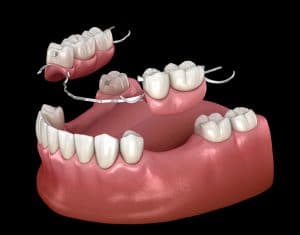 Losing a tooth or multiple teeth as an adult is often not a concern we are actively keeping to the forefront of our minds. In fact, there are often so many things to accomplish in a day that our oral health takes a seat on the back burner, only receiving care in the form of mindless brushing and flossing daily. While this is the first step to a lifelong grin, keep in mind that much more should be done in order to avoid infection, decay, and ultimately loss. In today’s blog, your Leawood, KS dentist will look at some solutions to restore your smile after loss, including with partial or full dentures.
Losing a tooth or multiple teeth as an adult is often not a concern we are actively keeping to the forefront of our minds. In fact, there are often so many things to accomplish in a day that our oral health takes a seat on the back burner, only receiving care in the form of mindless brushing and flossing daily. While this is the first step to a lifelong grin, keep in mind that much more should be done in order to avoid infection, decay, and ultimately loss. In today’s blog, your Leawood, KS dentist will look at some solutions to restore your smile after loss, including with partial or full dentures.



